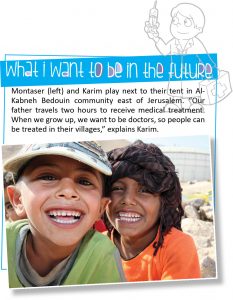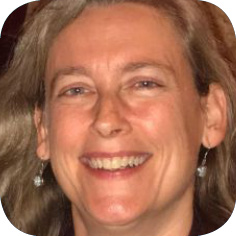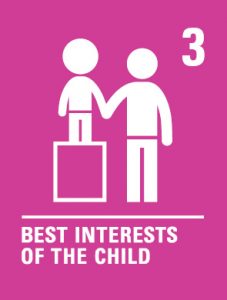 Schools should have nothing to do with the conflicts happening in the country. Children here should have the right to education, just like all the children of the world.
Schools should have nothing to do with the conflicts happening in the country. Children here should have the right to education, just like all the children of the world.
As an organization that fights for children’s rights across the world, Save the Children considers the UN Convention on the Rights of the Child (CRC) to be the single most important document for its work. Without it, there would have been no recognized children’s rights to fight for. The other reason why Save the Children has the UNCRC in its DNA is that our founder, Eglantyne Jebb, drafted the first Declaration on the Rights of the Child, which was adopted in 1924 by the League of Nations and became the predecessor of the UN Convention on the Rights of the Child. One hundred years ago, our founder wrote: “Every war is a war against children.” With all the current conflicts in our region and the extent to which children are being disproportionately affected, her words are more relevant now than ever before. This is why we launched Stop the War on Children, our biggest campaign this year. It calls on leaders, governments, armed non-state actors, humanitarian NGOs, and relevant bodies to recommit to protecting children in conflict. In the context of Palestine, we are calling on Israeli and Palestinian duty bearers to ensure access to safe, inclusive, quality education as a fundamental human right for every child, among their other rights.
The CRC enshrines children’s right to education and commits states that have signed on to it to take measures to make education available and accessible to all children. All countries face different challenges depending on how they make this happen, and they do it with varying degrees of success. When it comes to countries experiencing conflict or military occupation, the challenges can be overwhelming. But they are not insurmountable. This firm belief guides us in our fight for the right of every Palestinian child to education. For many Palestinian children and for their families – in the West Bank, in East Jerusalem and in Gaza – accessing their right to education is a daily struggle and requires enormous commitment and perseverance. We recently met with girls in one of our programs in the old city of Hebron H2, whose school is located in what was defined as a “closed military zone.” They performed a skit for Save the Children; they acted out their experiences, feelings, and fears from a day on which they had to evacuate their school by being hidden in the back of a food truck. After the skit, they told us how their involvement in the resilience-building and crisis-management work supported by Save the Children helps them cope with critical situations, which are a daily reality for them en route to school, in school, and on the way back. Their experiences are backed by reports by the UN Secretary General stating that military presence and security operations in H2 often involve the use of force by the Israeli military, as well as harassment and arbitrary arrests.
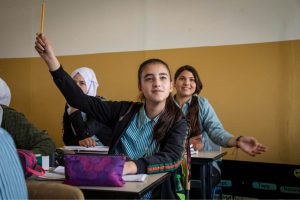
Children in Gaza are especially restricted when it comes to accessing their basic right to education. In Gaza, 70.4 percent of UNRWA schools and 62.8 percent of Ministry of Education schools run on a double or triple shift, and there is a shortage of 1,081 classrooms.
Save the Children supports vulnerable schools like this one in the West Bank to enhance their safety through school disaster management, disaster risk reduction, psychosocial support, and national system strengthening. We help communities to build their capacity to support the protection and education needs of children affected by the conflict. We also work with Palestinian government ministries and civil society to end violence against children inside the schools and at home, including offering positive-discipline trainings for teachers and parents.
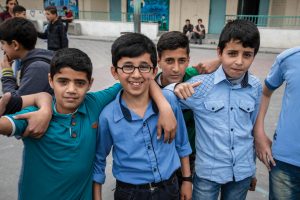
Through our work in Gaza, we witness the growth of remarkable boys and girls who form child-led groups to monitor how children’s rights are upheld.
We also work to support the inclusion of children with disabilities in education by equipping schools with sensory rooms and assistive devices, adapting curricula and school facilities, and providing Braille and talking laptops, in addition to establishing a special education database for follow up on children with disabilities in the schools.
To guarantee the right to education of Palestinian children, we have called on both Israeli and Palestinian decision-makers to sign and implement the Safe Schools Declaration, endorsed by almost 100 countries. States that sign the declaration agree on the importance of the continuation of education during armed conflict and emergencies, and take steps to ensure it. The Palestinian government has endorsed the Safe Schools Declaration, and we are supporting the Ministry of Education’s efforts to implement it.
We are also calling on the Israeli government to sign and implement the declaration. This would facilitate the revision of Israeli military behavior in and around Palestinian schools and strengthen the commitment to protect schools and schoolchildren from settler violence.
The Convention on the Rights of the Child remains the most widely ratified UN Convention and has already made a huge difference in the lives of millions of children on our planet. In Palestine, we celebrate its 30th anniversary with the unbreakable resolve that it will do the same for Palestinian children’s rights.
